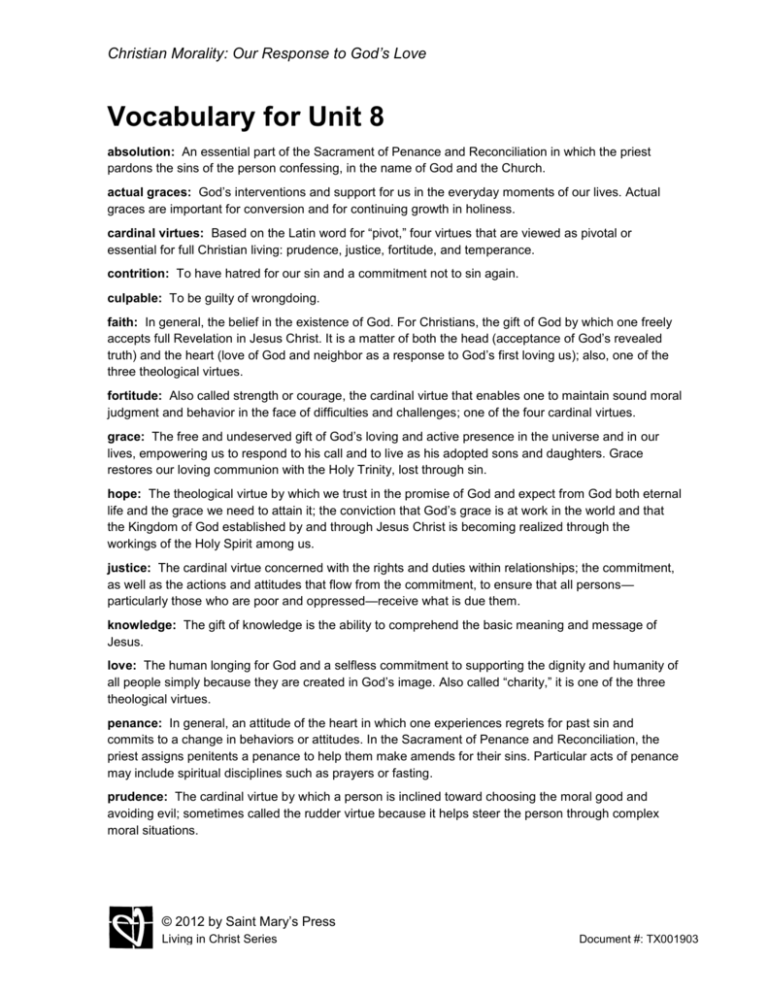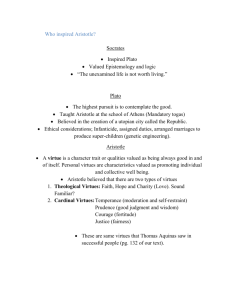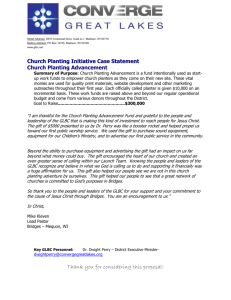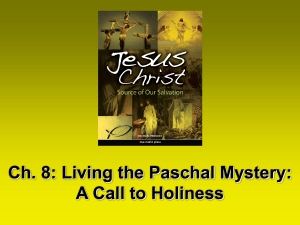Vocabulary for Unit 8
advertisement

Christian Morality: Our Response to God’s Love Vocabulary for Unit 8 absolution: An essential part of the Sacrament of Penance and Reconciliation in which the priest pardons the sins of the person confessing, in the name of God and the Church. actual graces: God’s interventions and support for us in the everyday moments of our lives. Actual graces are important for conversion and for continuing growth in holiness. cardinal virtues: Based on the Latin word for “pivot,” four virtues that are viewed as pivotal or essential for full Christian living: prudence, justice, fortitude, and temperance. contrition: To have hatred for our sin and a commitment not to sin again. culpable: To be guilty of wrongdoing. faith: In general, the belief in the existence of God. For Christians, the gift of God by which one freely accepts full Revelation in Jesus Christ. It is a matter of both the head (acceptance of God’s revealed truth) and the heart (love of God and neighbor as a response to God’s first loving us); also, one of the three theological virtues. fortitude: Also called strength or courage, the cardinal virtue that enables one to maintain sound moral judgment and behavior in the face of difficulties and challenges; one of the four cardinal virtues. grace: The free and undeserved gift of God’s loving and active presence in the universe and in our lives, empowering us to respond to his call and to live as his adopted sons and daughters. Grace restores our loving communion with the Holy Trinity, lost through sin. hope: The theological virtue by which we trust in the promise of God and expect from God both eternal life and the grace we need to attain it; the conviction that God’s grace is at work in the world and that the Kingdom of God established by and through Jesus Christ is becoming realized through the workings of the Holy Spirit among us. justice: The cardinal virtue concerned with the rights and duties within relationships; the commitment, as well as the actions and attitudes that flow from the commitment, to ensure that all persons— particularly those who are poor and oppressed—receive what is due them. knowledge: The gift of knowledge is the ability to comprehend the basic meaning and message of Jesus. love: The human longing for God and a selfless commitment to supporting the dignity and humanity of all people simply because they are created in God’s image. Also called “charity,” it is one of the three theological virtues. penance: In general, an attitude of the heart in which one experiences regrets for past sin and commits to a change in behaviors or attitudes. In the Sacrament of Penance and Reconciliation, the priest assigns penitents a penance to help them make amends for their sins. Particular acts of penance may include spiritual disciplines such as prayers or fasting. prudence: The cardinal virtue by which a person is inclined toward choosing the moral good and avoiding evil; sometimes called the rudder virtue because it helps steer the person through complex moral situations. © 2012 by Saint Mary’s Press Living in Christ Series Document #: TX001903 Vocabulary for Unit 8 Page | 2 reconciliation: The process of restoring broken relationships with God, with the Church, and with people who were directly offended by our sins. reverence: Sometimes called piety, the gift of reverence gives the Christian a deep sense of respect for God. right judgment: Sometimes called counsel, the gift of right judgment is the ability to know the difference between right and wrong and then to choose what is good. sacramental graces: The gifts proper to each of the Seven Sacraments. sanctifying grace: A supernatural gift of God by which our sins are forgiven and we are made holy. It restores our communion with God. special graces: Gifts intended for the common good of the Church, also called charisms. temperance: The cardinal virtue by which one moderates his or her appetites and passions to achieve balance in the use of created goods. theological virtues: The name for the God-given virtues of faith, hope, and love. These virtues enable us to know God as God and lead us to union with him in mind and heart. understanding: The gift of understanding is the ability to comprehend how a person must live her or his life as a follower of Jesus. wisdom: The gift through which the wonders of nature, every event in history, and all the ups and downs of our lives take on deeper meaning and purpose. wonder and awe: The gift of wonder and awe includes being aware of God’s majesty, unlimited power, and desire for justice, while at the same time being able to approach him with the trust of a child. This gift is sometimes translated as “the fear of the Lord.” © 2012 by Saint Mary’s Press Living in Christ Series Document #: TX001903








